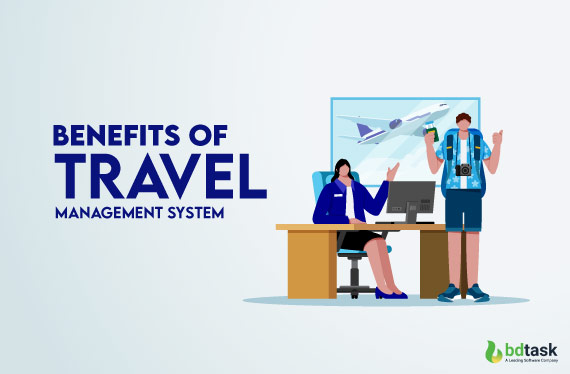What is Travel Management System and its Benefits

Are you looking for an answer to a travel management description? Then you are welcome. In this article, we will cover all the queries related to the travel management system. For example, what is travel management system, a travel management cycle, travel management responsibilities, travel management services, and many more? So don't go somewhere else; stay with us and explore all the details of a travel management system.
What is Travel Management System
The travel management system is a complete software system designed to manage all the tasks related to travel or tourism, such as travel planning, budgeting, booking, purchasing, travel tracking, expense monitoring, data recording, cost control, and so on.
Let's Discuss In Details:
Global travel management and tour management is a crucial part of the hospitality sector. Almost every hotel, resort, flight booking agency, tour booking agency, or other hospitality industry has travel and tour services.
So, it is a one-stop solution that the hospitality industry must pay attention to.
In the era of globalization, people visit different places for different purposes. Some visit for business purposes, to attend different types of functions or events, to spend quality time, and for many other reasons.
All of them want a secure and seamless travel experience. But corporate travel is not easy. It has many difficulties and complications. To reduce these types of travel problems, people are looking for a corporate travel company or agency to ensure an organized travel experience.
Travel management systems ensure an amazing travel experience with minimal cost. The travel management application is web-based. The Tours & Travels management system's primary goal is to give customers an easy way to reserve lodging, vehicles, and buses for tours.
The purpose of tour management is to assist travel agencies, tour operators, destination management companies, and travel agents in efficiently meeting their clients' needs.
Features of a Travel Management System
It is crucial to choose the right travel industry management system that effectively fulfills all your requirements. So, while choosing any travel management system, you have to look for the features that are most impactful and unique from others.
Here are the features of a travel management system that are most efficient.
1. Travel Policy Customization
Travel policy is the most efficient and crucial feature of a travel management system. An organization's travel policies are a collection of guidelines for handling employee travel plans and costs.
They optimize travel expenses, act as a guide for travel-related activities, and guarantee adherence to company policies and procedures.
2. Booking Management
Booking management features enable customers to make reservations for travel-related services such as hotels, rental cars, flight booking, bus ticket reservation and more through a single platform.
It might have functions like price comparison, booking confirmation, and real-time availability checks.They use different types of hotel reservation software for hotel room booking. Every travel management system should have these amazing features that are easy to use and work very smoothly and effectively. They use different types of hotel reservation software for hotel room booking.
3. Approval Workflow
Customizable approval workflow should be included in the travel management system. It helps to book a trip outside the actual policy.
When you have a customizable approval workflow, you can easily accept different types of booking approval and save the trip details.
It implements workflows for pre-trip approval requests, where employees submit travel plans for manager approval. Managers can review and authorize or reject requests based on predefined criteria, like budget pressure or trip necessity.
4. Inventory Management
Inventory management is an important part of any travel management system. It helps travel executives to track and manage all the inventory products and services.
With efficient travel inventory features, agencies can easily look for availability, reduce double bookings or overbooking, automatically update, etc.
It can reduce manual work by streamlining all the operations automatically, which can enhance the overall performance of a travel management system.
5. Reports Analytics
Report analysis is a feature that generates reports and analytics on travel expenses, booking patterns, compliance rates, traveler behavior, etc.
These visions help travel organizations optimize their travel policies, negotiate better deals with suppliers, and identify areas for cost savings.
To keep track of these reports and analytics manually is very difficult and less effective. With the help of real-time reporting, agencies can easily generate all the reports.
6. Risk Management
Risk management in the travel business is the consequence of travel-related uncertainty in reaching goals. Travel agencies or companies can benefit from an efficient risk management solution.
It provides resources for evaluating and reducing risks associated with travel, such as natural disasters, unstable political conditions, health issues, and many more.
Some of the possible advantages of risk management are understanding potential threats, saving money, protecting your reputation, strategic decision-making, etc.
7. Extensive Support
Comprehensive travel support is when travel management companies provide a type of service such as emergencies, accommodation, etc. Business travel is quite unpredictable and comes with different types of challenges.
For example, flight delays, bad weather, missing important documents or luggage, etc. It is important to solve these types of issues as soon as possible.
So, invest in a travel and tour management system that is available to solve any traveler issue immediately. However, it will not be a wise decision to make charges for providing these types of services.
8. Expense Management
Expense management is the most useful feature of a travel management system. It is a process of controlling, tracking, and organizing all activities related to travel expenses.
Expense management can help identify the pattern of spending money, how to reduce travel costs, etc.
It also helps consumers with budget monitoring, remuneration requests, and receipt tracking for travel. Smooth expense reporting could be facilitated by integration with accounting software.
9. Traveler Information Management
In the travel and tour industry, communication is very important. So, if you have a strong information management system that stores all the information of consumers, it helps with further communication.
Information management systems store traveler profiles and loyalty program memberships, including personal information, preferences, and travel history. This data enables personalized travel recommendations and facilitates easy booking processes.
10. Mobile Accessibility
Mobile accessibility is another essential feature of a travel management system. It offers mobile-friendly interfaces or dedicated mobile apps that allow travelers to manage their trips on the go, receive real-time updates, and access support services in case of emergencies.
Benefits of Travel Management System

Travel management systems help the business or individuals to manage the travel procedure. Implementing advanced travel software for small businesses has a lot of advantages.
Let's find out those benefits of using the travel management system.
-
Cost Savings
One of the biggest advantages of implementing a travel management platform is cost savings. A travel management system helps to reduce overall costs and travel expenses by implementing travel policies.
-
Policy Enforcement
Travel management systems guarantee that passengers are aware of the company's travel policy by highlighting non-compliant bookings and offering assistance to users. This helps prevent unapproved expenditures and maintains uniformity throughout the organization.
-
Improved Traveler Experience
Travel management systems offer a wide range of travel options, provide real-time updates and alerts, and offer support services. They enhance the overall travel experience for employees, leading to higher satisfaction and productivity.
-
Centralized Booking
A travel management system provides centralized travel booking. A centralized platform manages all travel-related activities, making it easier to manage bookings, track expenses, and access travel itineraries. This results in improved organization and visibility into travel plans.
-
Data Insights and Analytics
Travel management systems help to generate valuable insights and analytics on travel spending, booking trends, and traveler behavior with the use of travel policies. These visions help businesses to make data-driven decisions, identify cost-saving opportunities, and optimize their travel programs.
-
Efficiency and Productivity
Another great advantage of the travel management system is its ability to streamline the travel booking process, which increases efficiency and productivity. Automation and self-service capabilities save time for both travelers and administrative staff, allowing them to focus on more strategic tasks.
-
Integration with Other Systems
One of the amazing features of a travel management system is seamless integration with other enterprise systems, such as HR, finance, and CRM systems. It helps for better coordination, data sharing, and reporting across departments,leading to improved operational efficiency and decision-making.
-
Scalability and Flexibility
Travel management systems are scalable and adaptable to businesses' changing needs, whether they are expanding globally or implementing new travel policies and procedures.
5 Basic Functions of a Travel Management Agency
The main goal of travel management agencies is to make business travel easy and smoother for consumers. Travel agencies have different functions and provide services ranging from choosing the best hotel to booking tickets and comfortable accommodations to secure and stress-free travel experiences.
Here we will discuss the main basic functions of a travel agency company.
1. Travel Planning
Travel planning involves arranging and organizing all the details of a trip. Some necessary steps can effectively plan and make arrangements for a smooth travel experience.
Travel planning guide step by step.
- Define The Purpose
- Make A Budget
- Identify Travel Needs
- Accommodation Booking
- Research On Transportation
- Develop Itinerary
- Documentation Manage
- Provide Support During Travel
- Monitor Expense, Etc.
2. Consultation
Today, the travel and tour industry is not limited to providing accommodation and flight bookings. It has enlarged its services. Consultancy is a vital function that travel agencies provide.
Consultancy in travel management provides information to travelers, such as travel policies of the consumer's desired countries, behaviors, cost optimization, recommendations, and many others. Consulting firms have a great positive impact on business growth.
3. Insurance
Travel insurance coverage is a service or function provided by most travel agencies or companies. It is a type of insurance intended to cover all the unexpected situations or emergencies that happen on a trip.
List of some coverage that a travel agency ensures.
- Emergency medical Coverage
- trip cancellation
- Missed or delay travel
- Dismemberment
- Accidental Death
- Personal Belongings coverage, etc.
4. Travel Management
Travel agencies and tour operators have an important role in the growth of tourism around the world. Their contribution is extremely high for maximizing revenue by trading the travel operation and bringing together suppliers and customers.
According to several statistics, 90% of international and 70% of domestic tourist traffic is accounted for by the travel agency. Travel agencies manage all the essential parts of travel management solutions.
For example:
- Ticket Reservation
- Hotel Rooms Reservation
- Ground Services Reservations
- Cruise Package Sell
- Transportation Arrangement
- Manage Expense, Etc.
5. Foreign Exchange
Foreign exchange, short form FX or FOREX, is the process of transforming one currency into another currency at a foreign exchange rate. Although the transformation rate is not fixed, it constantly changes according to the market.
Different types of currencies are used worldwide, but US dollars, the British pound, the Japanese yen, and the Euro are the most traded currencies. Among all the currencies, US dollars are the key, with approximately 87% of the value traded daily. Travel agencies play an important role in arranging foreign exchange.
The Verdict
What is travel management system? If it was your main concern, by now, you have understood what a travel management system is and its importance. So, you really want to reduce your business travel costs, make smooth travel arrangements, and have easy data analysis along with real-time data reports. In that case, you must choose an advanced travel management system with advanced features.










